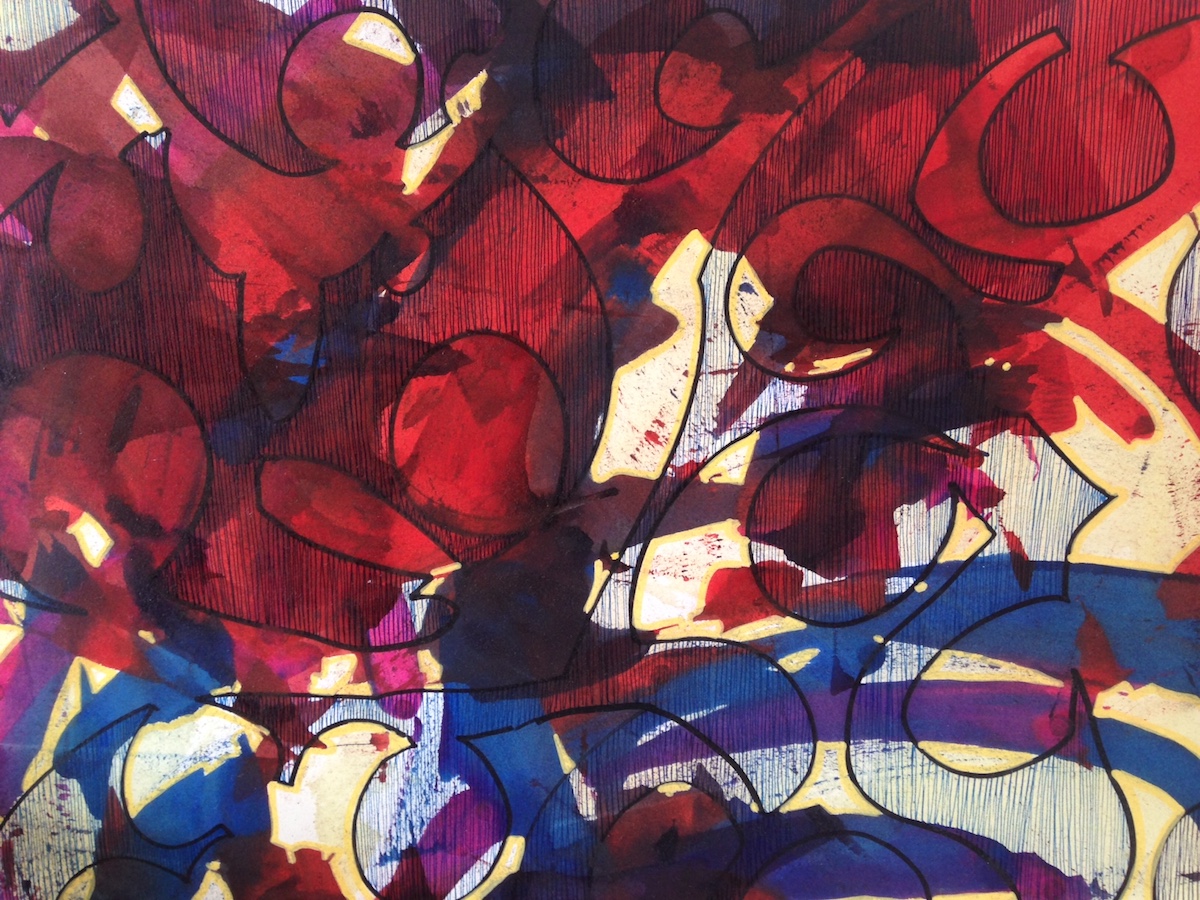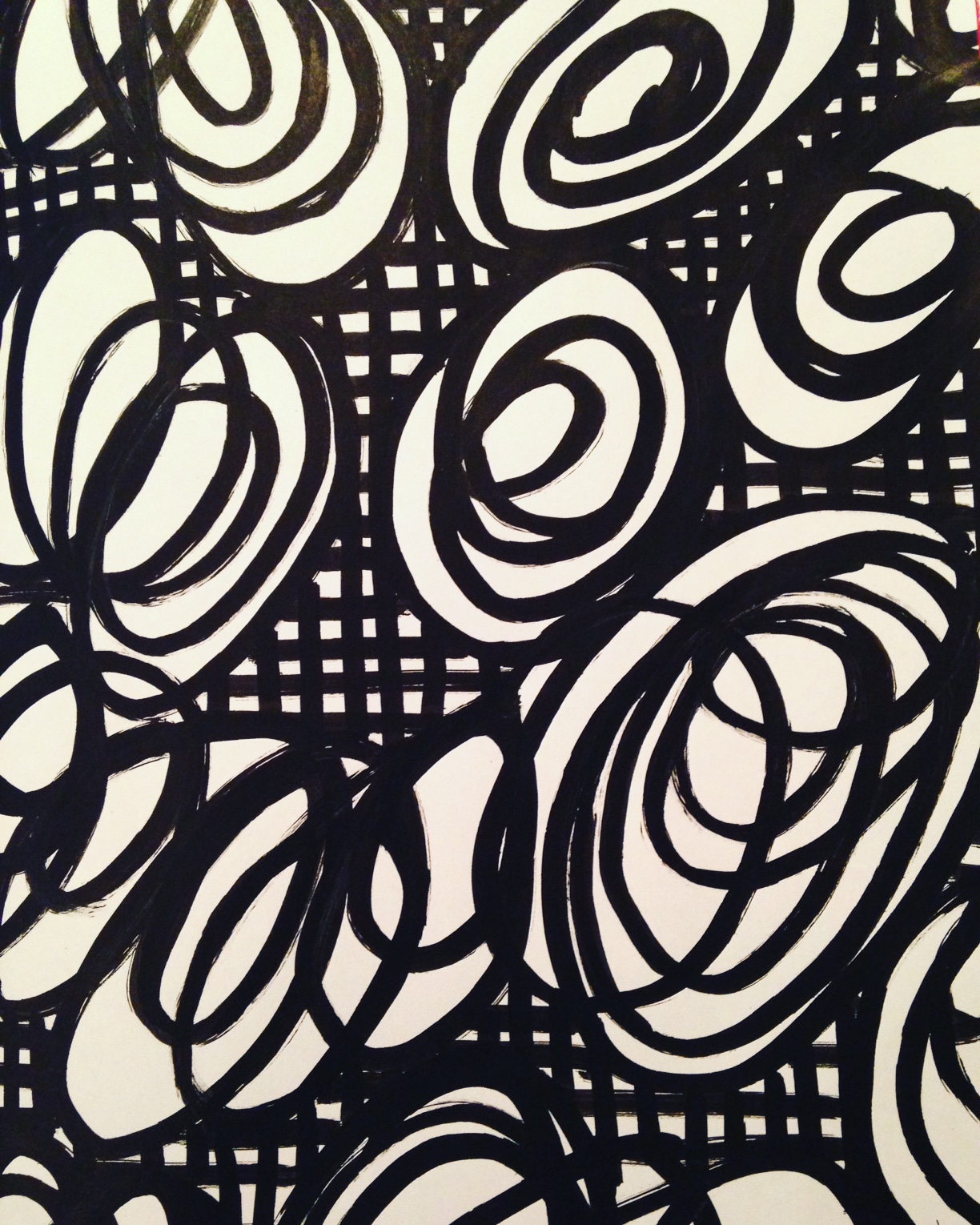1. Valorization
2. Periodically, words bubble up as I read. I think, “That’s a word I ought to use,” and then, “Oh yeah, I have nothing to write.”
3. Not writing, I’ve indulged in
—Doodling
—Considering how to reverse-engineer crossword puzzles from solutions to bizarre clues
—Dreaming of a crossword where every clue yields the answer “oreo”
—Thinking about, without jotting a word, each past juncture in my life
—Reading and listening
—Walking
—Sorting possessions into piles and judging them
—Dealing with those possessions justly and swiftly
—Researching places my extra funds might go
—Wasting time investigating how brains acquire words
4. For years, I logged running miles in the early morning before work, even before weak-tea pre-sunlight. On lucky weekdays, there came a sudden gold show. Landmarks appeared—the pastel house, the defunct plumbing supplier, the missing stretch of sidewalk, the pollocked tree—each sight notching progress. Streets I learned by repetition became rectangles, triangles, and squares, and, when I turned around, my shoes soggy from sweeping my feet through dew, I carried pictures, sounds, smells, motions, memories.
If anyone had asked what I did before work, I could have said. No one asked.
5. My family has a terrible history with sleep. My grandmother’s busy brain roused her in the middle of the night until she became bored enough to iron. For most of my childhood, my mom—reading exclusively between 12 and 3 am—finished three or four mysteries a week. My sister-in-law recounts my brother’s restless nocturnal walks about the house. He’s like Hamlet’s father’s ghost, she says. Just one thought wakes me. One worry, however stupid in daylight, assures I’ll circle anticipation and memory for an hour or so.
How much time have I recorded, barely remembered, just felt, nearly conscious?
6. I could iron, but we just don’t have that much ironing to do.
7. Here’s something interesting I learned while wasting time investigating how brains acquire words. Because of our deep instinct to gather sounds, we soak up intonation, cadence, and syllabic stress before birth. Babies whose parents speak French or German cry differently, and, gasping for their first breath, they know what we can’t know fully—how the language surrounding them verbalizes anger, fear, love, and suspicion. It will require a few years to bridge the communication gap reliably enough to say, approximately, what makes them angry, fearful, amorous, or wary. It will take longer to see themselves as some nationality, culture, or tribe.
Though maybe they knew long before.
8. Valorization, the second definition, means “the act or process of giving, assigning, or enhancing value.”
So many things I’ve thought valuable: my science award for a second grade project on space exploration, a paper weight my father gave me that encased a replica of an ancient coin in plexiglass, a plaster of paris bust of Abraham Lincoln I bought at a church white elephant sale, a teacher’s personal note, a student thanking me for helping her reach graduation, one of one thousand Instagram likes I took to heart.
9. The first girl I didn’t scare off was in high school, junior year. Maybe she dismissed my ardor as a performance. Maybe she remained guarded no matter how hard I assailed. Maybe she shared faith in our deep and abiding connection and affection.
I can’t be sure because all I have to fish for memory is the blunt hook of language.
10. When I can’t sleep, I see myself in a press conference beset by questions. I handle it by mimicking a blindfolded plate spinner… in the brightest spotlight… on a unicycle.
Are dreams necessary for creativity? Though you might appreciate an intense subconscious, must a person live a second vivid life as a dreamer to ignite imagination and invention?
Sleep knits “the ravell’d sleeve of care,” in such hurly-burly fashion. It’s exhausting.
11. On the way to the gym at 5:35 am, I turn to my wife and say, “I had the strangest dream.”
“What?” It’s the indulgent what.
“My mom was on horseback and barged into a herd of bears—like, there must have been 50 bears, cubs and all, moving en masse—and she angered them by kind of thoughtlessly ambling in. So they attacked her and the horse, climbing up with their claws, and grabbing her with wide open jaws.”
“Okay.”
“One had my mom’s head completely in its mouth, but then the horse and my mom veered close to the lake and they all fell in, bears and all.”
“Weird.”
“After that, I called 911, and my mom was fine.”
“So, what do you think—it’s 5:45—can we be out of the gym by 6:15?”
12. Perhaps it’s aging filling memory to overfull, but lately learning seems like an exchange. I’m always asking, “What am I going to lose?”
Except that’s not exactly it. So many memories are diminished without being lost—the whiff of last night’s sautéed onions clinging to my sweater or the light before snow that exactly matches the time I really talked to a best friend.
13. I ask everybody, “If you had a choice between remembering things and remembering where you remember them from, what would you choose?”
Mostly people blink.
It’s provenance. Which matters more, the thing itself or its origin? I might be satisfied with what I possess—why does it matter where it came from?—or I might want to investigate its creation, the deep ferment or combustion that made it be.
14. Being here and being there: standing at the Paulina L stop, listening to a book about making the most of your day, eradicating your bad habits, and just generally being a much happier person, then checking your Transit App to know how long the Brown Line to the Loop will be.
15. “Valorization” is maybe too big a word. It attracts undue attention to itself.
People perceive children as sponges for second languages, but what if they just have more room? Once they grow up, some may seek words to slip between “aroma” and “perfume,” between “summon” and “evoke,” deciding between subtle colors and tones. Others will satisfy for whatever.
For them, “Valorization” is positively out.
16. I used to tell people that my father, a pathologist, might have had a bigger medical vocabulary than most people have a regular one.
Now I wonder if he had enough words even then. What about all the stuff amidst and among the gist and the ginsued, the unnamed and dim, all the lurking, redolent, and resonant things barely there?


 Surprise! Even on the internet, something defies discovery.
Surprise! Even on the internet, something defies discovery.
 1.
1.
 In a drawing class a few years ago, a teacher asked us to draw a chair by depicting all the spaces around it. Drawing the not-chair, he told us, restarts the mind, tricks it into bypassing the brain’s assumptions about how a chair should look. The exercise does, as he promised, force you to scrutinize the scene afresh.
In a drawing class a few years ago, a teacher asked us to draw a chair by depicting all the spaces around it. Drawing the not-chair, he told us, restarts the mind, tricks it into bypassing the brain’s assumptions about how a chair should look. The exercise does, as he promised, force you to scrutinize the scene afresh. and after 36 years of teaching, I’m working part-time this year, meaning I have not only fewer classes but also fewer responsibilities as advisor, club sponsor, or coach. My schedule is largely open. I arrive a little before I teach. I leave a little after I finish. This new regimen is only a couple of weeks old but feels mostly like not-teaching. Assumptions about my life’s purpose have changed.
and after 36 years of teaching, I’m working part-time this year, meaning I have not only fewer classes but also fewer responsibilities as advisor, club sponsor, or coach. My schedule is largely open. I arrive a little before I teach. I leave a little after I finish. This new regimen is only a couple of weeks old but feels mostly like not-teaching. Assumptions about my life’s purpose have changed. So I also work on work more than necessary—planning, grading, and planning some more. My son correctly predicted I’d have trouble kicking workahol, and he was right. I’m still waking at 4 am to reread what I’m teaching and put the finest of finishing touches on lesson plans. I’ve discovered you never need run out of work if you can think of more work to do. I’ve concluded everything takes exactly as long as you have to do it.
So I also work on work more than necessary—planning, grading, and planning some more. My son correctly predicted I’d have trouble kicking workahol, and he was right. I’m still waking at 4 am to reread what I’m teaching and put the finest of finishing touches on lesson plans. I’ve discovered you never need run out of work if you can think of more work to do. I’ve concluded everything takes exactly as long as you have to do it. A life of fulfilling expectations, keeping appointments, and meeting deadlines hasn’t prepared me for initiative. For a workaholic, a fine line divides idleness and guilt. Relaxation seems out of the question. I read the back pages of the paper, listen to podcasts as soon as they appear in my feed, and try to do those household chores I too often neglect. I’m embarrassed to admit how often I check Instagram. Yet I wonder about where I’m going, who I am now that I’m only part time me.
A life of fulfilling expectations, keeping appointments, and meeting deadlines hasn’t prepared me for initiative. For a workaholic, a fine line divides idleness and guilt. Relaxation seems out of the question. I read the back pages of the paper, listen to podcasts as soon as they appear in my feed, and try to do those household chores I too often neglect. I’m embarrassed to admit how often I check Instagram. Yet I wonder about where I’m going, who I am now that I’m only part time me.
 My profession demands infinite alternate explanations. Teaching young writers, I exchange one description for another and turn to what something is like instead of what it is. A research paper is baking a cake, passage analysis is throwing a pebble in the pond, a writer must swing, as Tarzan does, from vines chosen in advance.
My profession demands infinite alternate explanations. Teaching young writers, I exchange one description for another and turn to what something is like instead of what it is. A research paper is baking a cake, passage analysis is throwing a pebble in the pond, a writer must swing, as Tarzan does, from vines chosen in advance. I momentarily lost it last fall when another senior complained about reading 22 pages assigned over two nights—in 14-point font, with sections interrupted and the rest of the page blank. In I983, my first year of teaching, I asked my department chair what homework reading load was reasonable. I operated on her standard for nearly a decade, 30 pages, but since then…
I momentarily lost it last fall when another senior complained about reading 22 pages assigned over two nights—in 14-point font, with sections interrupted and the rest of the page blank. In I983, my first year of teaching, I asked my department chair what homework reading load was reasonable. I operated on her standard for nearly a decade, 30 pages, but since then… “Nuance” isn’t a verb, though I heard it used as one
“Nuance” isn’t a verb, though I heard it used as one 


